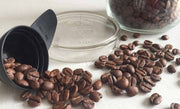Coffee, discovered thousands of years ago, is popular all over the world because of its special flavor and refreshing effect. It is the drink with the most flavor and health-preserving effect in the world.
Because coffee beans are rich in plant antioxidants, their antioxidant efficacy is even higher than that of cocoa, green tea, and black tea of the same kind. A study in the Journal of Nutrition also pointed out that coffee is actually the largest source of antioxidants in the adult diet. source
When it comes to drinking coffee, most of the impressions are limited to refreshment, and in the past it was always considered to be stimulating and prone to clinginess, so many people love and fear it
However, according to many epidemiological observations, it has been confirmed that drinking coffee in moderation is indeed beneficial to health, and is related to a lower incidence of diseases (such as cerebrovascular disease, diabetes, liver disease, etc.)
What are the scientifically proven effects (benefits) of drinking coffee?
1. Beneficial for postoperative ileus
Postoperative ileus occurs most commonly after abdominal surgery (defined as temporary inhibition of gastrointestinal motility due to non-mechanical causes following surgical intervention) and is characterized by nausea, vomiting, abdominal distension, delayed defecation or flatulence, inability to Tolerance to oral diet, occurring in 10% to 30%
Postoperative ileus delays recovery, thereby prolonging hospital stays, increasing the risk of postoperative complications, and placing a substantial financial burden on healthcare providers, with administrative costs approaching $1.5 billion per year in the United States alone
A meta-analysis of 13 randomized controlled trials involving 1246 patients undergoing abdominal surgery indicated that drinking coffee after surgery, regardless of caffeine content, may reduce postoperative ileus after colorectal and gynecologic surgery (postoperative ileus) and length of hospital stay.
*Conclusion: For intestinal obstruction after abdominal surgery, drinking coffee may have a positive effect, but limited by the possible risk of bias of the included studies, further verification is still needed
2. Promote metabolism, help burn fat, and help lose weight
In the past, people only had to worry about not getting enough to eat and becoming thin and skinny. However, due to changes in lifestyles and refined diets, the obesity rate remains high. The overweight population has almost surpassed the slender population.
Weight loss is a journey that most people (especially women) have experienced, but most of the time they always move forward aimlessly. Due to their different physiological structures, women need to take on the important task of reproducing the next generation. Therefore, it is easier to store fat, which is conducive to maintaining body temperature and providing energy sources, so it is more difficult to maintain a standard weight than men
Several studies have found that caffeine in coffee can affect energy balance and increase thermogenesis, helping to increase metabolic rate by 3-11%
Another study found that caffeine helps weight-lossers maintain their weight. The mechanism behind it is related to the fact that drinking coffee can increase energy consumption and reduce calorie intake (it may have an appetite-suppressing effect). And if you can combine drinking coffee and exercise, you can achieve a better fat burning and weight loss effect (compared to exercise alone)

3. lower risk of high blood pressure
Hypertension is currently the most common chronic disease in adults, with a prevalence rate of up to 25% (approximately 1 billion people), and it is estimated that by 2025, it may increase by 60%
90% of hypertension is a primary symptom of unknown cause, but it is usually related to diabetes, cancer, cardiovascular disease, chronic respiratory disease, asthma, musculoskeletal disease
A literature meta-analysis (Meta-Analysis, including 7 population studies, 205,349 participants) showed that increasing coffee intake moderately reduced the risk of hypertension, whereas in a linear dose–response, daily An extra cup of coffee reduces the risk of high blood pressure by 1 percent.
The mechanism behind it is related to the anti-oxidation and stimulating nitric oxide production effects of the chlorogenic acid component, which can inhibit free radicals and promote the health of vascular endothelial cells
*Conclusion: Daily coffee consumption is negatively correlated with the incidence of hypertension, and moderate intake can reduce the risk of disease
4. Reduce the risk of liver cancer
Liver cancer is a common cancer of the digestive tract, ranking 5th and 8th in the list of male and female cancers, especially hepatocellular carcinoma, which accounts for about 80%
Among the causes of hepatocellular carcinoma, 70% to 90% of patients have a history of chronic liver disease or cirrhosis. The main risk factors include viral hepatitis, alcoholic liver disease or non-alcoholic fatty liver. Others include obesity, diabetes, and genetic diseases and food contaminated with aflatoxin
A meta-analysis of the literature pointed out (meta-analysis, including 16 observational studies of liver cancer population), subjects who have the habit of drinking coffee can reduce the risk of hepatocellular carcinoma (Hepatocellular Carcinoma) by about 40% on average.
The same study also found that the hepatoprotective effect of coffee is consistent regardless of any ethnic group or subgroup (such as gender, alcohol abuse, hepatitis or liver disease history)
Another meta-analysis of literature on dose-response analysis also pointed out (meta-analysis, including 18 population observation studies), drinking 1 cup of coffee a day can reduce the risk of liver cancer by 15% (but there is no significant relationship with the risk of biliary tract cancer) .
*Conclusion: A population observation study found that those who drink coffee have a lower risk of liver cancer
5. Reduce the risk of dementia (Alzheimer's disease)
People with dementia are one of the diseases that the elderly are most afraid of suffering from. Among them, Alzheimer's disease is the most important, accounting for 70% of all cases. The prevalence rate has increased from 1% after the age of 60 to 35% after the age of 90
Alzheimer's disease is a neurodegenerative disease. The initial symptoms include loss of memory and sense of direction, impaired judgment and decision-making, and language barriers. In the middle and late stages, various mental symptoms may even begin to appear, such as depression, apathy, anxiety, agitation, and delusions. , hallucinations, etc., causing difficulties in caring for the patient's family members
A meta-analysis (Meta-analysis, including 11 prospective studies, with a sample size of 29,115 people) pointed out that although drinking coffee could not significantly improve cognitive decline and dementia index, it was found in subgroup analysis that it could help reduce 27% risk of developing Alzheimer's disease (those who consumed the most vs those who consumed the least)
The underlying mechanism is believed to be related to the fact that the ingredients in coffee have the effect of inhibiting Adenosine Receptor Antagonists (Adenosine Receptor Antagonists), thus slowing down the nervous system damage caused by the accumulation of beta-amyloid plaques, but still Waiting for further verification and further confirmation

6. Reduce the risk of non-alcoholic fatty liver disease
Non-alcoholic Fatty Liver Disease is a disease of ectopic fat, the most common liver disease in Western countries, affecting about one in three people, and patients are usually asymptomatic (but non-specific symptoms have been reported including fatigue and right upper quadrant discomfort)
Fatty liver refers to the abnormal accumulation of fat in liver cells (obesity and diabetes are the main causes). Depending on the degree, the disease progression can be divided into steatosis, steatohepatitis, fibrosis and even liver cirrhosis. A serious complication is hepatocellular carcinoma.
A systematic literature review and meta-analysis (Meta-analysis, including 5 studies) pointed out that regular coffee drinking habits can help reduce the incidence of non-alcoholic fatty liver by 29%. In addition, for subjects who already suffer from non-alcoholic fatty liver, drinking coffee can reduce the risk of liver fibrosis by 30%.
7. Reduce the incidence of type 2 diabetes
Diabetes is one of the fastest-growing diseases in the world. It is caused by obesity, lack of exercise and poor eating habits. According to the statistics of the World Health Organization, 9% of the world's population over the age of 18 suffers from diabetes. If blood sugar is out of control for a long time, it will cause Irreversible symptoms such as blindness, amputation, and kidney failure
Many studies have found that coffee drinking is inversely related to the incidence of diabetes, and the incidence of a large number of intakes is much lower than that of those who do not consume it, and each cup of coffee can reduce the relative risk by about 7%.
In a large Systematic Review (including 193,000 men and women), those who drank 6 cups of coffee a day had a 35% lower risk of developing diabetes, compared with 28% for those who drank 4-6 cups (compared with drink less than 2 cups)
Another generational study (Cohort Study) (including 41,934 men and 84,276 women) also observed that if a daily intake of more than 6 cups of coffee, both men and women can reduce the incidence of type 2 diabetes by 54% and 29% respectively (compared to non-drinkers)
The mechanism behind it is believed to be related to chlorogenic acid-Chlorogenic Acid and trigonelline-Trigonelline in coffee beans, both of which have been found to have the effect of lowering blood sugar and improving insulin concentration (found in oral glucose tolerance test)
8. Reduce the incidence of cardiovascular disease
Cardiovascular disease is a health killer second only to cancer, especially for the elderly, it has the characteristics of high morbidity, high mortality, and high disability rate
Clinically, it has also been found that about 80% of cardiovascular diseases are caused by arteriosclerosis and vascular obstruction, not only prone to coronary heart disease, but also prone to heart failure, stroke and claudication (lower extremity vascular obstruction)
In the early days, several studies believed that drinking coffee may increase the risk of coronary heart disease, but after years of verification, it has been confirmed that drinking coffee in moderation is still beneficial to cardiovascular health
In a large Finnish/Finnish observation (including 59,490 people, the observation period was as long as 19.2 years), it was found that women who consumed 1 to 2 cups of coffee a day could reduce the risk of heart failure by 27% (compared to those who did not drink)
Another large-scale observation of diabetic patients also found that drinking coffee can help reduce the risk of all-cause mortality and death from cardiovascular disease by 30%
9. Reduce the incidence of stroke
Stroke is mainly divided into hemorrhagic and ischemic vascular lesions. Since the brain is one of the most oxygen-consuming organs in the human body (10 times that of the heart), once the blood vessels in the brain are blocked or hemorrhage when transporting oxygen or energy, the nerve cells are easily damaged. In the event of injury, if the cerebral artery blood flow is interrupted within 30 seconds, the damaged cells may recover. If it is interrupted for more than 5 minutes or even several hours, the nerve cells are almost completely destroyed, so it is very important to maintain the normal function of cerebral blood vessels
An observation found that coffee drinkers may help reduce the rate of hemorrhagic stroke Cerebral Hemorrhage by 36%.
Other observations have also found that those who drink 3-4 cups of coffee a day can reduce the risk of dying from stroke by 23% (compared with those who drink less than 2 cups), and those who drink 5-6 cups can reduce the risk by as much as 36%

10. Improve sports performance
Whether you are a professional athlete or just an ordinary person who exercises occasionally, using various scientific methods to improve sports performance not only makes people feel more fulfilled, but also improves the motivation to continue
In the study, it was found that caffeine can increase the epinephrine in the blood. Adrenaline is a kind of hormone, which is usually secreted in large quantities in response to fight or flight, so that the body can cope with a large amount of physical exertion.
In addition, caffeine can also promote the release of fatty acids from fat cells and enter the blood for energy use
Combining the above two effects, it was mentioned in a meta-analysis of sports tests (Meta-analysis/including 40 double-blind trials) that caffeine can improve sports performance, and the average score can be increased by 12.3% (especially sports that require endurance)
Wildstud™ Maca Energy Coffee: The New Way to Boost Your Sex Drive
Imagine if there was a drink that could help you boost your sex drive. We're talking about Wildstud™ Maca Energy Coffee, the all-natural drink that can help rev up your sex life.
Wildstud™ Maca Energy Coffee is made accurately with a unique blend of herbs and spices that has been used for centuries to improve sexual function. The coffee is also loaded with antioxidants and minerals essential for overall health and vitality.
If you need a way to spice up your love life, then Wildstud™ Maca Energy Coffee is the perfect drink for you. Not only will it assist you in feeling more aroused and excited, but it will also give you more energy and stamina in the bedroom. So what are you waiting for? Order a bag of Wildstud™ Maca Energy Coffee today and start enjoying the best sex of your life!

What are the side effects of drinking coffee? (harm)
Most of the side effects associated with coffee are associated with short-term excess caffeine intake. Common adverse reactions include palpitations, rapid heartbeat, insomnia, anxiety, restlessness, tremor, headache, abdominal pain, nausea, vomiting, diarrhea, polyuria, etc. Unusually high doses of caffeine may also lead to hypokalemia.
For long-term coffee drinkers, if they suddenly stop or reduce the number of cups, caffeine withdrawal may occur. Common symptoms include headache, fatigue, irritability, difficulty concentrating, and depression.
Drinking coffee may increase blood pressure by 3-4 mm/Hg, and for those who drink coffee habitually, these effects will gradually disappear (due to the development of tolerance) Note 19-20
However, some studies have also pointed out that the emergence of tolerance is not complete, especially for certain groups of people (such as hypertensive patients, overweight people, the elderly), it may have a strong effect of increasing blood pressure, so be careful to avoid excessive caffeine intake
Safety Precautions (Contraindications)
Some drugs interfere with the liver's metabolism of caffeine, which may increase caffeine-related side effects (eg, acid suppressants/Tagamet, anti-addicts/Antabuseestrogens, antimycotics/Diflucan, antipsychotics/Luvox, antiarrhythmics/Mexitil, Antifungal agent / Lamisil)
For those with insufficient calcium intake, consuming coffee (more than 4 cups, containing about 330 mg caffeine) may increase the risk of osteoporosis
Excessive caffeine intake (more than 300 mg per day) during pregnancy may increase the risk of miscarriage and fetal weight loss, but so far, the relevant results are still inconsistent, but for the sake of caution, it is best to reduce intake during pregnancy (no more than one cup)







